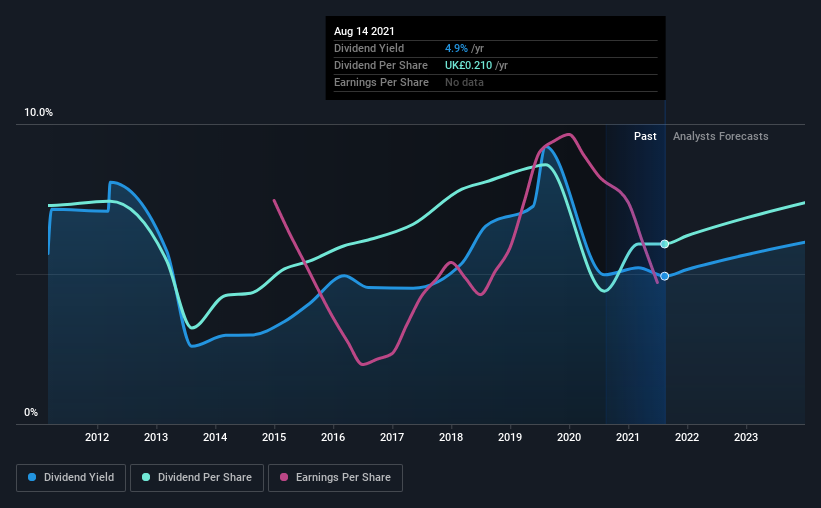
The board of Aviva plc (LON:AV.) has announced that it will be increasing its dividend on the 7th of October to UK£0.073. This will take the dividend yield from 4.9% to 6.7%, providing a nice boost to shareholder returns.
Check out our latest analysis for Aviva
Aviva's Earnings Easily Cover the Distributions
While it is great to have a strong dividend yield, we should also consider whether the payment is sustainable. Before making this announcement, Aviva was earning enough to cover the dividend, but it wasn't generating any free cash flows. No cash flows could definitely make returning cash to shareholders difficult, or at least mean the balance sheet will come under pressure.
Over the next year, EPS is forecast to expand by 45.1%. If the dividend continues on this path, the payout ratio could be 64% by next year, which we think can be pretty sustainable going forward.

Dividend Volatility
Although the company has a long dividend history, it has been cut at least once in the last 10 years. The first annual payment during the last 10 years was UK£0.26 in 2011, and the most recent fiscal year payment was UK£0.21. The dividend has shrunk at around 1.9% a year during that period. A company that decreases its dividend over time generally isn't what we are looking for.
The Dividend Looks Likely To Grow
Growing earnings per share could be a mitigating factor when considering the past fluctuations in the dividend. It's encouraging to see Aviva has been growing its earnings per share at 19% a year over the past five years. While on an earnings basis, this company looks appealing as an income stock, the cash payout ratio still makes us cautious.
Our Thoughts On Aviva's Dividend
Overall, we always like to see the dividend being raised, but we don't think Aviva will make a great income stock. While Aviva is earning enough to cover the payments, the cash flows are lacking. We would be a touch cautious of relying on this stock primarily for the dividend income.
Companies possessing a stable dividend policy will likely enjoy greater investor interest than those suffering from a more inconsistent approach. Meanwhile, despite the importance of dividend payments, they are not the only factors our readers should know when assessing a company. Just as an example, we've come across 4 warning signs for Aviva you should be aware of, and 2 of them make us uncomfortable. If you are a dividend investor, you might also want to look at our curated list of high performing dividend stock.
When trading Aviva or any other investment, use the platform considered by many to be the Professional's Gateway to the Worlds Market, Interactive Brokers. You get the lowest-cost* trading on stocks, options, futures, forex, bonds and funds worldwide from a single integrated account. Promoted
New: Manage All Your Stock Portfolios in One Place
We've created the ultimate portfolio companion for stock investors, and it's free.
• Connect an unlimited number of Portfolios and see your total in one currency
• Be alerted to new Warning Signs or Risks via email or mobile
• Track the Fair Value of your stocks
This article by Simply Wall St is general in nature. We provide commentary based on historical data and analyst forecasts only using an unbiased methodology and our articles are not intended to be financial advice. It does not constitute a recommendation to buy or sell any stock, and does not take account of your objectives, or your financial situation. We aim to bring you long-term focused analysis driven by fundamental data. Note that our analysis may not factor in the latest price-sensitive company announcements or qualitative material. Simply Wall St has no position in any stocks mentioned.
*Interactive Brokers Rated Lowest Cost Broker by StockBrokers.com Annual Online Review 2020
Have feedback on this article? Concerned about the content? Get in touch with us directly. Alternatively, email editorial-team (at) simplywallst.com.
About LSE:AV.
Aviva
Provides various insurance, retirement, investment, and savings products in the United Kingdom, Ireland, Canada, and internationally.
Undervalued average dividend payer.


